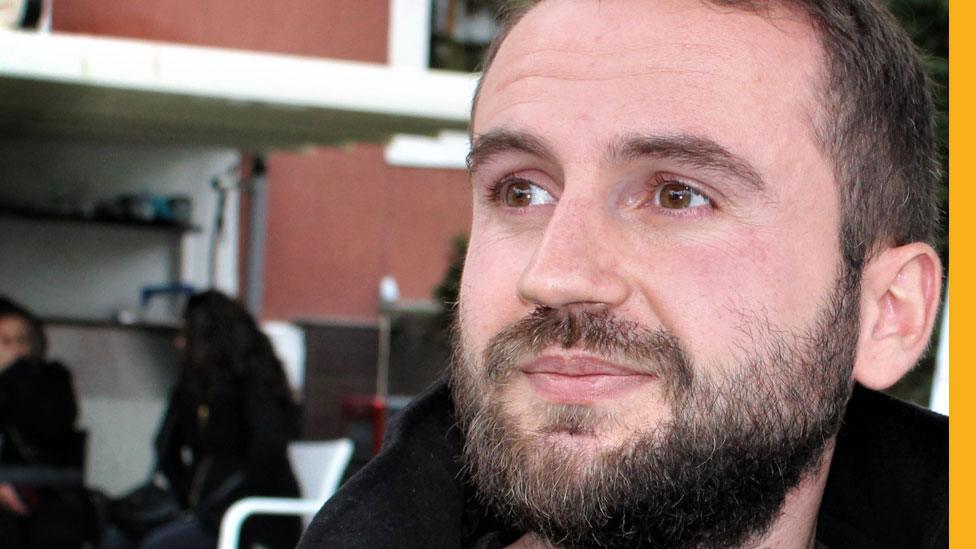'I was accused of being a member of ISIS'
- Published
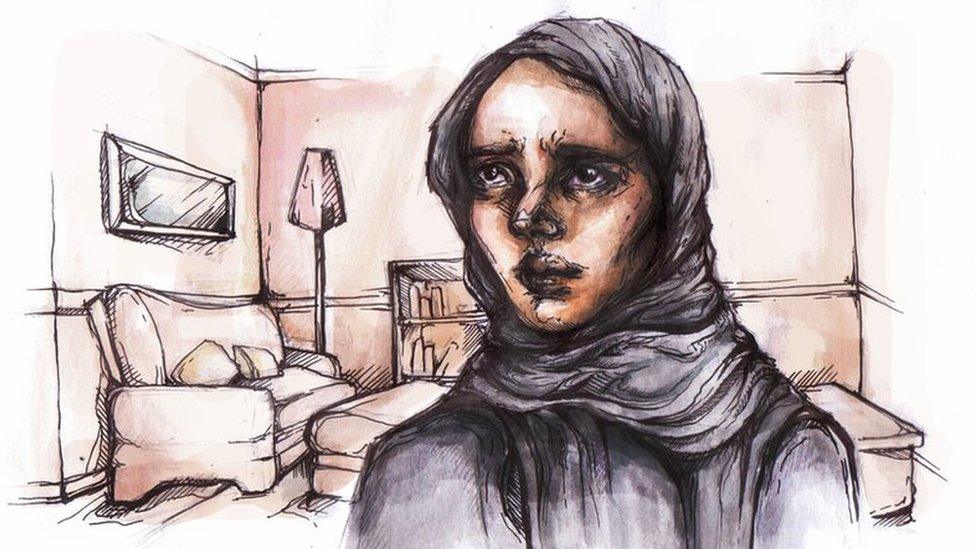
Aminah (not her real name) back home in London
As fighters for the Islamic State group return home from the Middle East following defeats in Syria and Iraq, UK security services are faced with the difficult job of deciding who could pose a potential terror risk.
It's a typical domestic scene. Dinner is nearly ready in a cluttered, homely kitchen and the sound of cartoons plays out from the living room, along with the low babble and laughter of three young children, whose attention is focused on the brightly-coloured characters on the TV screen.
Aminah (not her real name) is in her mid-20s. She's intelligent, chatty, with a London accent. She wears a black hijab which leaves her young face uncovered.
She recently moved to west London, renting a small, first floor flat on a sprawling estate. Although we already know some of her story, from official paperwork acquired in Turkey, it's still surprising to hear her say the words: "I was accused of terrorism."
Missing passport
Aminah has just come back to the UK after months in Turkish detention. Her explanation for being there is a version of a story used by many and therefore attracts suspicion.
She claims she left London with her husband for Turkey in 2014, moving for his work and taking their young son.
At the time, the Islamic State (IS) group was encouraging people to join its self-declared caliphate across the Turkish border in Syria.
Aminah says that while in Turkey she gave birth to her other two children, but that only two weeks after moving there, her British passport was stolen while she was on a train.
This missing passport would be key to the next part of her life, where she and her children would be held in Turkish custody and deported back to the UK on suspicion of terrorism.
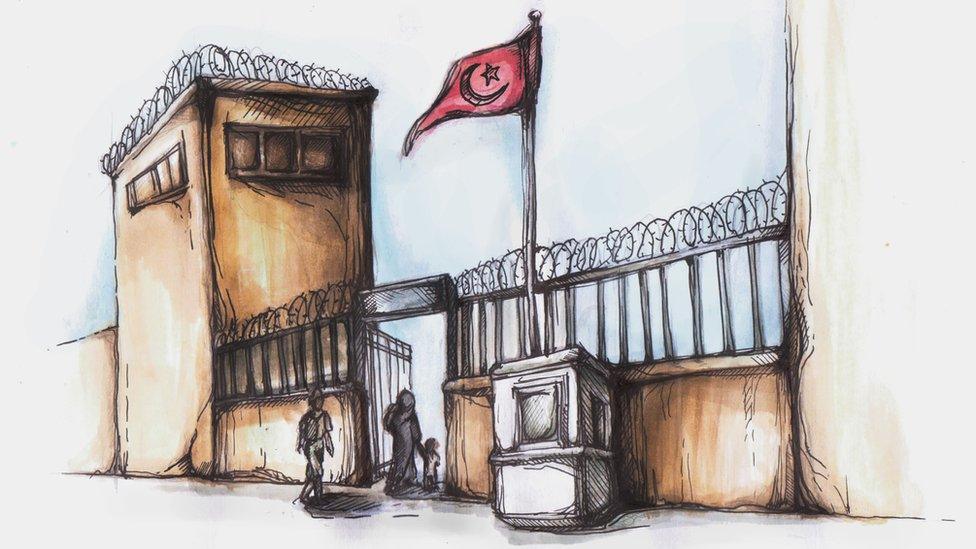
She was held in a Turkish detention centre
After moving to Turkey, Aminah says that she and her husband had marriage problems and divorced.
She says she met a new partner and that he was driving the family through Turkey when they were stopped at a random checkpoint. Aminah said she was asked to show her ID.
"I didn't have my passport, so they put us in the detention centre," she said.
Not being able to show your passport is a red flag for the Turkish authorities. As well as videos of barbaric beheadings and battlefields, IS frequently published footage of new recruits burning their passports as a sign of loyalty to the group.

Read more on Islamic State

More than 600 miles away from the border with Syria, Aminah and her children were taken to the Izmir removal centre. They were placed on the ground floor, which she said was known as "the terrorist wing" with several suspected jihadi brides.
Aminah says there were many other women locked up alongside them, mainly Russians, accused of being part of IS. She says she only discovered she was under suspicion when she landed back at Heathrow.
Aminah claims she was so shocked when she was arrested at the airport that she started to vomit.
"My whole body went into shock, I was shaking," she says.
She raises and shakes her hands as she tells her story and explains that police detained her, along with her children, for questioning before telling her she was accused of travelling to Syria to be part of IS.
"They said we suspect that you've been involved with ISIS and I was like 'no, not really, I haven't'," she says. "They don't have any evidence that's the thing - or else they would have convicted me."
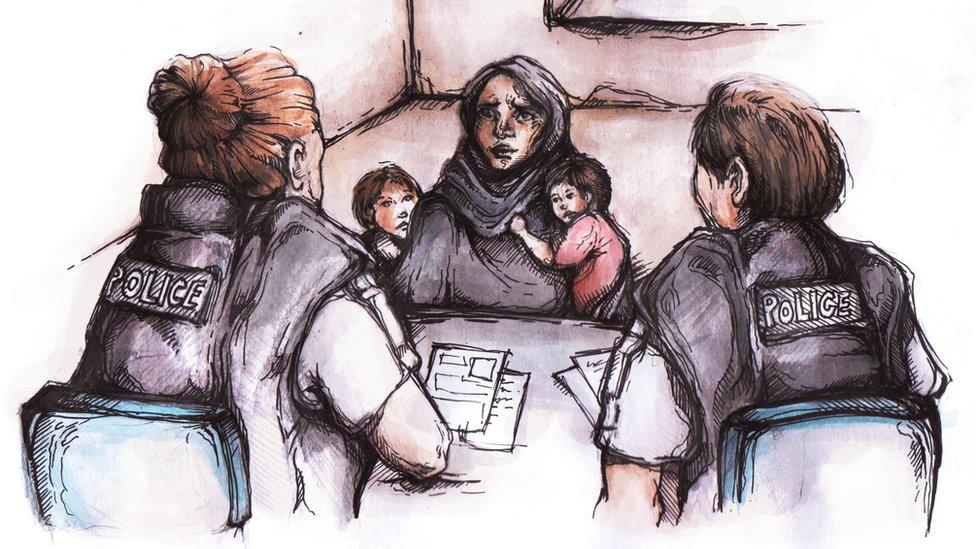
Police interviewing Aminah at Heathrow Airport
The risks of not having a passport - or having passports for her youngest children - were well known at the time when she was travelling close to the border with Syria.
Asked whether she had been to Syria, Aminah said she never had.
When she returned to the UK, Aminah said she was allowed to leave Heathrow after about four hours of questioning. But with no evidence to prove her version of events, says she knows she is still being watched.
"I definitely know that they [the police] keep an eye on me. They openly contact me."
Aminah seems to understand and accepts the fact that she will continue to be monitored by the security services, who have the difficult job of working out who is telling the truth once back in the UK.
'Wrong place at wrong time'
According to the Home Office, 900 men, women and children have left the UK for areas occupied by IS in Syria and Iraq since 2012.
Of those, 40% have now returned home. The issue for UK security services is telling apart those who travelled for law-abiding purposes - such as humanitarian missions - from those who joined IS.
The trouble is, most people claim the former, using it as a smokescreen to hide their involvement with violence and the evidence is often scattered across battlefields 3,000 miles away.
Only 40 people have been prosecuted on their return to the UK, a figure Security Minister Ben Wallace says is not as many as he would have liked.
He said: "Where people can be prosecuted, we would like them prosecuted but it's very hard to gather evidence…and we can only operate within the rule of law."
He says new legislation will make it easier to prosecute people who have been abroad.
Aminah's explanation for being in what she calls "the wrong place at the wrong time" is similar to stories told by many other returnees.
She was cautious about telling her story and spoke softly and guardedly during our interview. Before she agreed, she asked us to keep her identity secret.
It seems there's no bigger taboo than being accused of being a member of IS once you're living back home.

File on 4: 'Back Home from ISIS' is on BBC Radio 4, 19 June at 20:00 BST or you can listen on the BBC iPlayer.
Have you got something you want investigating? We want to hear from you. Tweet us, external or email us fileon4@bbc.co.uk.
- Published12 October 2017
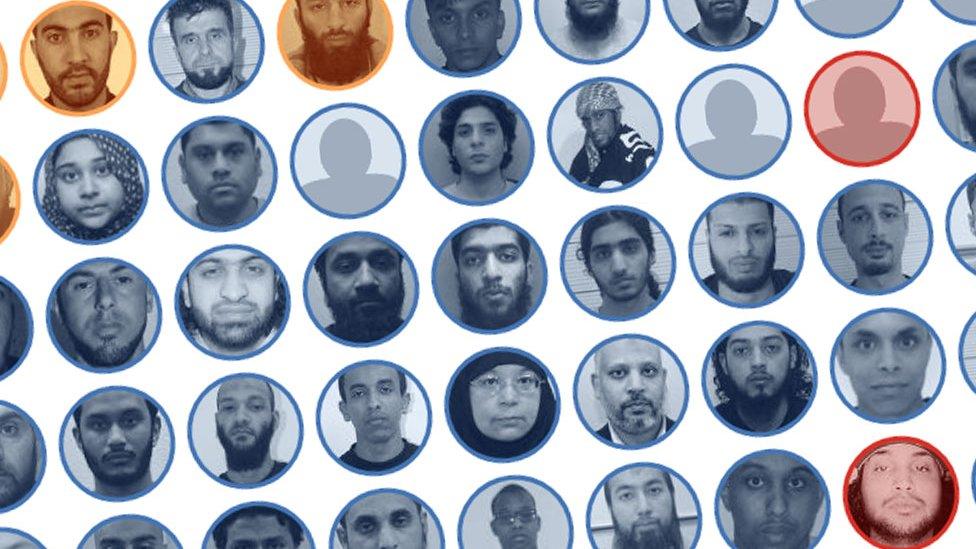
- Published23 October 2017
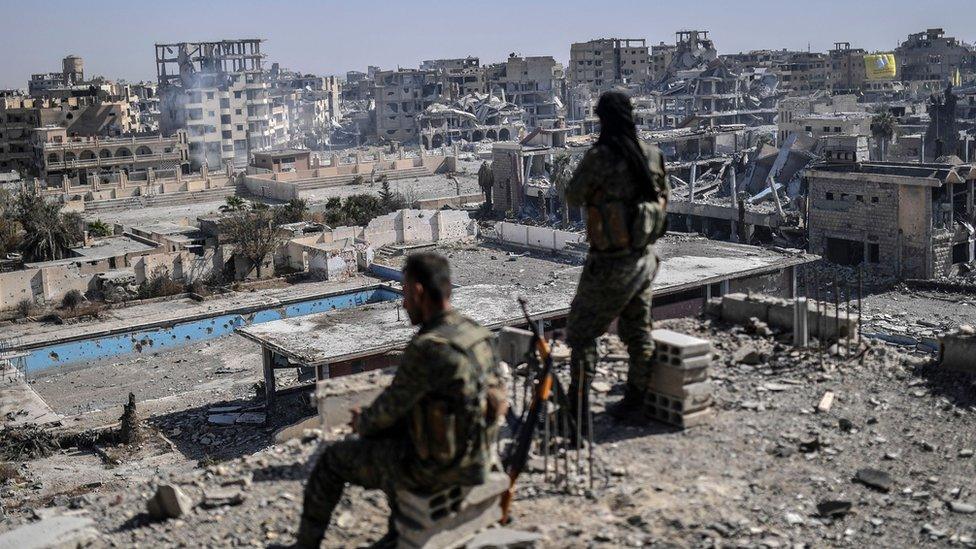
- Published25 February 2018
